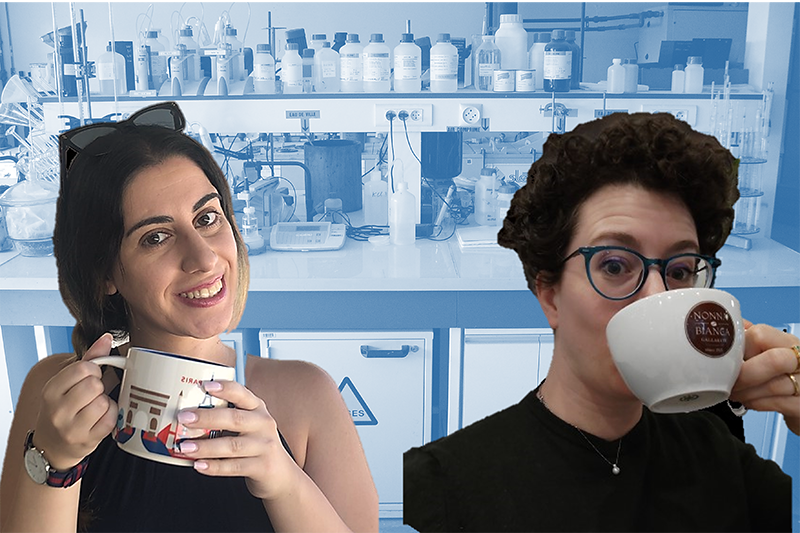Relationships shape who we are and how we see the world. What seems like an arduous mountain climb can become an enjoyable trek with the right advice and perspective. Mentorship has that purpose. It connects young scientists with senior researchers who can help them to develop, or activate, the skills needed to face challenges ahead. Senior scientists might also benefit from help to place a situation in perspective or strategise future steps.
Scientists in all STEM fields find themselves at crossroads often: during their studies, when choosing a research topic, when deciding on a host institute or when selecting collaborators. Scientists undertake extensive training to become highly competent in a specific disciplines – they learn how to operate devices, how to analyse data – but what happens when they need help to shape their careers, develop as people or face difficult situations with colleagues?
Mentoring can be an answer.
We are two scientists at different stages of our careers. Maria Koumouri is based in Cyprus and Greta Faccio is in Switzerland; we are a mentee and a mentor respectively, with a common interest in this topic. We would like to share a few considerations about the mentorship process and how to welcome it to best unlock its potential for both mentee and mentor. We came across mentoring through friends’ experiences and non-profit organisations. Unfortunately, we have seen fewer opportunities for mentoring in universities and research institutes, where acquiring hard skills is the priority; in our experience, mentorship is often inadequate or not offered.
- Six lessons from facilitating a formalised mentoring programme
- Giving and receiving doctoral writing feedback
- Career mentoring can support student employability
We like to describe mentors and mentees as two pieces in the middle of a big puzzle, both matching also with other tesserae, people who can share their experiences and provide feedback when needed. It is a puzzle that is built over time. Unlike marriage, it is not exclusive nor for life, although it requires commitment from both parties.
What to expect as an academic mentee
For a young researcher who is wondering about their next career move or how to handle a difficult interpersonal situation, the opportunity to enhance soft skills has added value. In those moments, young scientists might think: “I wish someone who has been there could give me advice on this matter.” But when they look around, they see only a demanding boss and competitive colleagues. Friends working outside academia barely understand the struggle and dedication that scientists have for their work – the long nights, weekends in the lab and skipping holidays to finish publications.
If you are a potential mentee, remember that it is normal to have nerves and doubts about it. Although you will probably talk about work, the mentoring session is also a chance to focus on your concerns and explore how to tackle them together.
Here are a few pieces of advice for a prospective mentee:
- Before the conversation begins: Gather your thoughts and feelings. You might be nervous or hesitant because you don’t know what to expect; the mentor is busy and you are afraid of wasting her time; you want to look prepared with questions; you want to be professional. However, mentoring sessions are no different from having a chat over coffee with a person you share interests and values with. Write down your concerns and questions so that you can drive the conversation and ask your mentor for the support or information you need.
- During the session: Consider that mentors have been in your shoes and are there to help and support you, not judge you. Most of them will be rational and compassionate. They will listen to your concerns carefully. Be authentic during your session; do not just state facts, but show your feelings so your mentor can have a better idea of your situation. In this way, you create a connection and build trust with each other, which is key for a successful mentoring relationship. I won’t forget how relieved I felt when my mentor said: “You are not the only one who worries about that. Don’t worry, together we can figure it out.”
- After the session: You will feel calmer and more confident because someone spent time listening to you and offering practical help. You will realise that you have more control than you thought. In our professional and personal lives, we are all a work in progress. Asking for help and advice rather than working alone in a bubble is not weakness; it is strength. You just have to take that first step and trust that everything will fall into place eventually.
What to expect as an academic mentor
Deciding to become a mentor can be daunting, but it is also an occasion to reflect on your personal growth. Don’t assume that you will have all the answers and don’t be afraid to answer with “I don’t know” or “I have never thought about it”. Take your time and remember that you can refer your mentee if someone else can provide help that is beyond your expertise. As a mentor, be willing to share your experience and point of view. Here are other points to consider:
- Before the conversation: Take time to free your thoughts and make room for your mentee’s story. When going to the meeting or tuning in virtually, consider how you can create a comfortable situation and an atmosphere of openness.
- During the conversation: Sharing personal experiences can help you to connect, and asking open questions can help you enter “listening mode”. Details make a difference; feelings are often more important than data. A mentee from academia might find this idea difficult to accept because they often feel as if they need a linear career, secure funding and a professorship to be successful. At the same time, working in science means continuous learning and always striving to do better. This is a good life philosophy, but can also be stressful when you step out of the lab. Accepting the idea that the future might look different and that your highly cited publications might not determine your future after all can be hard. Kindness and an open mind are crucial to make the mentee feel accepted and comfortable to talk about their doubts and perceived weaknesses. End with an open question or a plan for what is desired to happen before the next chat.
- After the conversation: Summarise your considerations. Perhaps send a concluding message to the mentee to offer your availability for a future meeting.

How to sustain a mentor-mentee relationship
We recommend fostering the mentee-mentor relationship. For the mentee, it is inspiring to have a person you can look up to throughout your career. For the mentor, keeping in touch with the mentee can help you assess if the exchange was fruitful and offer further support if needed. This can be done via email or social platforms.
A mentee who has received support and acquired skills through mentoring will probably be willing to become a mentor themselves as a way to support other people. This is the virtuous cycle of mentoring.
Greta Faccio works in intellectual property and is a scientific consultant based in St Gallen, Switzerland. Maria Koumouri is a doctoral researcher in the department of biological sciences at the University of Cyprus.
If you would like advice and insight from academics and university staff delivered direct to your inbox each week, sign up for the Campus newsletter.




comment